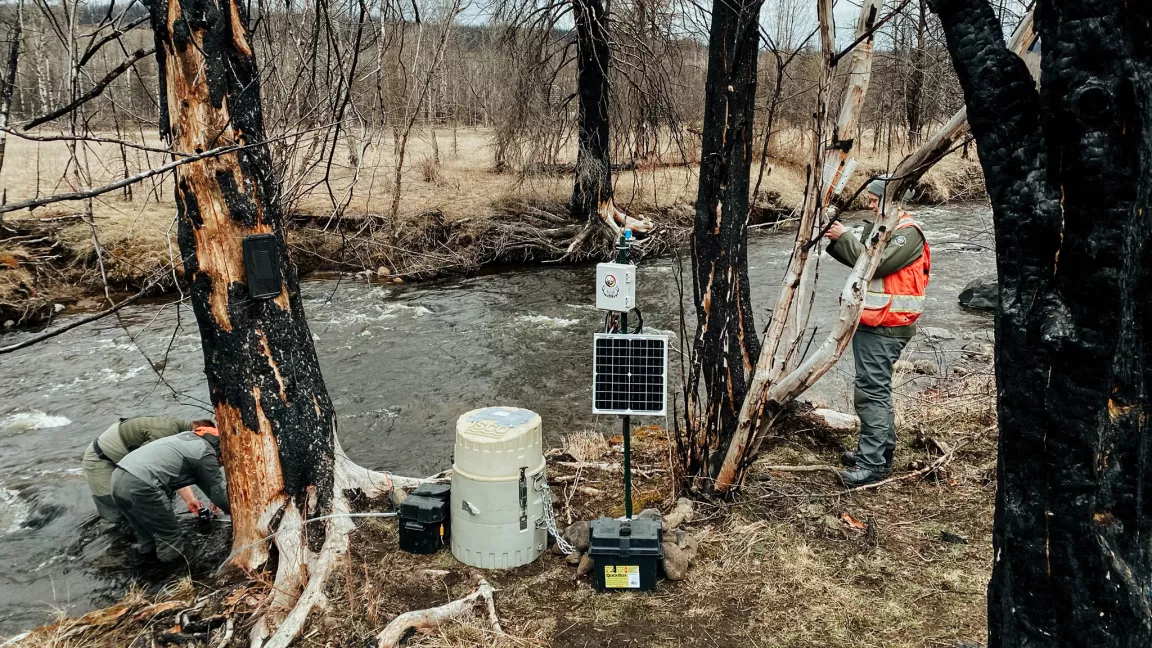Restoring watersheds and salmon habitats post-wildfire
A multi-party initiative led by the Skeetchestn Indian Band, supported by UNBC and other partners, is restoring the Deadman River and studying innovative, culturally-informed strategies to mitigate the impacts of severe wildfires on watersheds and salmon habitats.

Prince George, B.C. –A new, multi-party research project funded by the BC Salmon Restoration and Innovation Fund (BC-SRIF) is taking action to restore the Deadman River, located west of Kamloops, while simultaneously investigating how mitigation measures following severe wildfires can help protect landscapes and important salmon habitats.
Tsecmenúl̓ecwem-kt (We Repair the Land) is a three-year, $4 million project led by the Skeetchestn Indian Band in collaboration with Skeetchestn Natural Resources Corp., University of Northern British Columbia, University of British Columbia, Thompson Rivers University, BC Ministry of Forests, Fisheries and Oceans Canada, Pacific Salmon Foundation, SLR Consulting, Secwépemc Fisheries Commission and Urban Systems. The Deadman Watershed was severely impacted by the Sparks Lake wildfire, the largest wildfire in B.C. in 2021. The fire burnt more than 900 square kilometres of land including 60% of the traditional territory of the Skeetchestn Indian Band.
Skeetchestn Natural Resources Corp, along with partners such as Urban Systems, are leading the design and implementation of the land- and channel-based restoration and mitigation measures, while the “science team” are monitoring the response to these measures and assessing how landscapes respond to severe wildfires. The project involves testing how nature-based, culturally appropriate mitigation measures can be used to stop water runoff, soil erosion, mass movements and sediment transport in creeks and rivers that typically follow major wildfires.
“The Tsecmenúl̓ecwem-kt Initiative is a very significant part of Skeetchestn’s responsibility to restore and protect our lands and waters in alignment with our traditional values. This initiative empowers us to address critical watershed impacts but has also deepened partnerships across communities, experts, and organizations. Through collaboration, we bring together diverse perspectives and knowledge systems, creating impactful, resilient solutions that honour our connection to the land and serve as a model for sustainable stewardship” said Don Ignace, general manager of Skeetchestn Natural Resources Corp.
UNBC is a key partner of the science team, monitoring and assessing the hydrological, geomorphological and ecological responses.
“By using a combination of experiments on hillslopes, river channel monitoring, and remote sensing approaches, the science team will be able to help advise Skeetchestn Indian Band as to which of the mitigation measures are most effective,” said Department of Geography, Earth and Environmental Sciences (GEES) Professor and Research Chair, Dr. Phil Owens
This innovative research comes at a time when the impacts of wildfire on streams and rivers is of increasing interest across North America and the globe. The threats from wildfire extend beyond just aquatic habitat and organisms, as many impacted watersheds are also sources of drinking water for local communities.
GEES post-doctoral fellow Dr. Kristen Kieta acknowledges the relevancy of this work from multiple perspectives. “Post-wildfire recovery is vital as B.C. moves towards a future with larger and more severe fires,” she explains. “Working with Skeetchestn Indian Band and blending their traditional knowledge of the territory with the knowledge held by the other partners is an important and timely step forward in our research methods.”
Ultimately, the project’s participants aim to develop and refine an adaptive management approach, including a long-term monitoring program, for the Deadman Watershed with an aim to accelerate its recovery. Beyond the Deadman Watershed, it is hoped that the project will produce learning outcomes that can be applied across much of B.C.